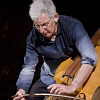Home » Jazz Musicians » Mario Pavone
Mario Pavone
Bassist/composer Mario Pavone has collaborated with both legendary innovators and today's most respected young musicians to consistently define the cutting edge of jazz for the past 40 years.
He has anchored the trios of Paul Bley (1968-72), Bill Dixon (1980's), and the late Thomas Chapin (1990-97), and co-led a variety of notable ensembles with Anthony Braxton, Wadada Leo Smith, Marty Ehrlich, and Michael Musillami. His list of sidemen past and present includes Steven Bernstein, Gerald Cleaver, Dave Douglas, Peter Madsen, Tony Malaby, Joshua Redman, George Schuller, Michael Sarin, Craig Taborn, and Matt Wilson among many others.
And, unlike most artists whose careers span five decades, his most recent recordings are his most widely acclaimed, appearing on best-of- the- year lists from Slate.com, AllAboutJazz.com, AllAboutJazz-New York, Coda, Village Voice, and The New York Times among others.
Although a long career in jazz awaited him, Pavone never received formal music training and didn't seriously encounter jazz until his freshman year at the University of Connecticut in 1958. Growing up in Waterbury, Connecticut, he developed a fondness for black R&B vocal groups, as well as the 1940's movie music he heard as a child, but a college friend's jazz record collection—and seeing John Coltrane one fateful night at the Village Vanguard in 1961—set him on the musical path. With legendary guitarist/fellow Waterbury native Joe Diorio's encouragement, Pavone rented a bass in the summer of 1964 and began plucking out the percussive sound that would become his trademark.
He was playing professionally by 1965, though his full- time job was putting his Industrial Engineering degree to work for major corporations. Upon hearing the news about Coltrane's death in 1967, he left his briefcase on his desk, got in the car, and drove to the funeral, where he decided on the spot to dedicate the rest of his life to music.
He toured Europe with Paul Bley in 1968, and performed on the pianist's recording, Canada (Radio Canada), with Barry Altschul. Soon after he met vibraphonist/ composer Bobby Naughton, among others, and became a part of New York's early 70's loft scene with groups like Bill Dixon's Orchestra of the Streets. By 1975, he was a founding member of the New Haven, Connecticut-based Creative Music Improvisers Forum (CMIF), with Naughton, Wadada Leo Smith, Gerry Hemingway, Wes Brown, Reverend Dwight Andrews and others, which produced concerts and recordings that gave musicians more control over their own music.
In 1980, Pavone began an 18-year musical relationship with Thomas Chapin, which would lead to a number of collaborations, most notably Chapin's seminal trio with drummer Michael Sarin. Around the same time, Pavone recorded his first titles as a leader, 1979's Digit and 1981's Shodo on his own Alacra label, crediting Naughton and Smith with motivating him to write his own music and teaching him about open-ended composition.
Read moreTags
Mario Pavone: Blue Vertical

by John Sharpe
There is an inevitably tinge of sadness to Blue Vertical. Not because of any particular flavor of the music, but because, along with Isabella (Clean Feed, 2021) it's one of two final releases by bassist Mario Pavone, who died aged 80 less than two months after this March 2021 recording session. Pavone began his career in the '60s free scene, and became a stalwart of bandleaders as diverse as trumpeter Bill Dixon and saxophonist Thomas Chapin. In a ...
Continue ReadingThe Latest From Clean Feed Records

by Mark Corroto
2021 marks the twentieth year of Lisbon's Clean Feed Records. Listeners went from thinking ”who knew there was jazz in Portugal?" to acknowledging the label as the flag bearer of jazz' vanguard. Besides releasing music by Evan Parker, Mats Gustafsson, Steve Lehman, Julius Hemphill, Charles Gayle, Anthony Braxton, Elliott Sharp, Eric Revis, Harris Eisenstadt, and Kris Davis, they have introduced the world to the Scandinavian ensembles Friends & Neighbors, Cortex, and the various incantations of Angles. Perhaps of greater importance, ...
Continue ReadingMario Pavone, Broken Shadows, Dan Rosenboom & Maria Grand

by Maurice Hogue
The much-respected and much-loved bassist Mario Pavone passed away in May. With great strength and fortitude and supreme dedication to the music he loved, he completed two full albums earlier this year. You'll hear a couple of tracks from one of the recordings Blue Vertical, released by Out Of Your Head Records. R.I.P. Mario. It was an honour to play your music. New York quartet, Broken Shadows, which is Tim Berne, Chris Speed, Reid Anderson and Dave King, ...
Continue ReadingMario Pavone, Unscientific Italians, Bill Frisell, Paul Jarret & New Releases

by Ludovico Granvassu
This week we pay tribute to the late Mario Pavone, with an epic live set in which his majestic bass sound propelled the Thomas Chapin Trio into the stratosphere at the 1995 Newport Jazz Festival. The rest of the playlist revolves around modern jazz guitar, with two different ways to pay tribute to Bill Frisell, by the Unscientific Italians and Skuli Sverrisson; the revelatory new albums by Hungarian guitarist Csaba Palotai (with Steve Arguelles) and French guitarist Paul Jarret, the ...
Continue ReadingMario Pavone / Dialect Trio +1: Blue Vertical

by Karl Ackermann
Bassist and composer Mario Pavone died on May 15, 2021, after a seventeen-year battle with cancer. The Connecticut native had many interests and earned a degree in engineering, a Doris Duke Foundation grant and, for a quarter-century, shared his wisdom and talent with kids at the Litchfield Performing Arts Jazz Camp, where he also served as a board member. In the 1970s, Pavone, along with Wadada Leo Smith and Anthony Braxton helped launch The Creative Musicians Improvisors Forum, a Northeast ...
Continue ReadingMario Pavone: Philosophy

by Giuseppe Segala
Ci sono musicisti che percorrono con discrezione il proprio itinerario artistico e, pur senza collocarsi nel novero dei protagonisti, si ritagliano un ruolo importante di connettori, di tenaci tessitori delle trame che rendono vitale e significativo un periodo artistico. Il contrabbassista Mario Pavone è senz'altro uno di questi. Un musicista prezioso, prodigo di iniziativa. Lo abbiamo apprezzato al fianco di Bill Dixon e in una serie copiosa di registrazioni con Thomas Chapin, in trio con Michael Sarin alla batteria. Ma ...
Continue ReadingMario Pavone Dialect Trio: Philosophy

by Mark Corroto
In his review of their debut Chrome (Playscape Recordings, 2013), my learned colleague at All About Jazz, Dan McClenaghan described Mario Pavone's Dialect Trio as “a beautiful tumult." That description expanded with the trio's sophomore disc Blue Dialect (Clean Feed, 2015) and maybe further with their latest Philosophy. The maelstrom they foment is partly explained by their schedules. Drummer Tyshawn Sorey is a composer of jazz and new classical music and multi-instrumentalist—check out his piano chops on That/Not (Firehouse 12 ...
Continue ReadingJazz Musician of the Day: Mario Pavone

Source:
Michael Ricci
All About Jazz is celebrating Mario Pavone's birthday today!
Bassist/composer Mario Pavone has collaborated with both legendary innovators and today's most respected young musicians to consistently define the cutting edge of jazz for the past 40 years. He has anchored the trios of Paul Bley (1968-72), Bill Dixon (1980's), and the late Thomas Chapin (1990-97), and co-led a variety of notable ensembles with Anthony Braxton, Wadada Leo Smith, Marty Ehrlich, and Michael Musillami. His list of sidemen past and present ...
read more
Jazz Musician of the Day: Mario Pavone

Source:
Michael Ricci
All About Jazz is celebrating Mario Pavone's birthday today!
Bassist/composer Mario Pavone has collaborated with both legendary innovators and today's most respected young musicians to consistently define the cutting edge of jazz for the past 40 years. He has anchored the trios of Paul Bley (1968-72), Bill Dixon (1980's), and the late Thomas Chapin (1990-97), and co-led a variety of notable ensembles with Anthony Braxton, Wadada Leo Smith, Marty Ehrlich, and Michael Musillami. His list of sidemen past and present ...
read more
Jazz Musician of the Day: Mario Pavone

Source:
Michael Ricci
All About Jazz is celebrating Mario Pavone's birthday today!
Bassist/composer Mario Pavone has collaborated with both legendary innovators and today's most respected young musicians to consistently define the cutting edge of jazz for the past 40 years. He has anchored the trios of Paul Bley (1968-72), Bill Dixon (1980's), and the late Thomas Chapin (1990-97), and co-led a variety of notable ensembles with Anthony Braxton, Wadada Leo Smith, Marty Ehrlich, and Michael Musillami. His list of sidemen past and present ...
read more
Jazz Musician of the Day: Mario Pavone

Source:
Michael Ricci
All About Jazz is celebrating Mario Pavone's birthday today!
Bassist/composer Mario Pavone has collaborated with both legendary innovators and today\'s most respected young musicians to consistently define the cutting edge of jazz for the past 40 years. He has anchored the trios of Paul Bley (1968-72), Bill Dixon (1980\'s), and the late Thomas Chapin (1990-97), and co-led a variety of notable ensembles with Anthony Braxton, Wadada Leo Smith, Marty Ehrlich, and Michael Musillami... Read more.
Place our Musician of the ...
read more
Jazz Musician of the Day: Mario Pavone

Source:
Michael Ricci
All About Jazz is celebrating Mario Pavone's birthday today!
Bassist/composer Mario Pavone has collaborated with both legendary innovators and today\'s most respected young musicians to consistently define the cutting edge of jazz for the past 40 years. He has anchored the trios of Paul Bley (1968-72), Bill Dixon (1980\'s), and the late Thomas Chapin (1990-97), and co-led a variety of notable ensembles with Anthony Braxton, Wadada Leo Smith, Marty Ehrlich, and Michael Musillami... Read more.
Place our Musician of the ...
read more
Jazz Musician of the Day: Mario Pavone

Source:
Michael Ricci
All About Jazz is celebrating Mario Pavone's birthday today!
Bassist/composer Mario Pavone has collaborated with both legendary innovators and today\'s most respected young musicians to consistently define the cutting edge of jazz for the past 40 years. He has anchored the trios of Paul Bley (1968-72), Bill Dixon (1980\'s), and the late Thomas Chapin (1990-97), and co-led a variety of notable ensembles with Anthony Braxton, Wadada Leo Smith, Marty Ehrlich, and Michael Musillami... Read more.
Place our Musician of the ...
read more
Jazz Musician of the Day: Mario Pavone

Source:
Michael Ricci
All About Jazz is celebrating Mario Pavone's birthday today!
Bassist/composer Mario Pavone has collaborated with both legendary innovators and today\'s most respected young musicians to consistently define the cutting edge of jazz for the past 40 years. He has anchored the trios of Paul Bley (1968-72), Bill Dixon (1980\'s), and the late Thomas Chapin (1990-97), and co-led a variety of notable ensembles with Anthony Braxton, Wadada Leo Smith, Marty Ehrlich, and Michael Musillami... Read more.
Place our Musician of the ...
read more
Jazz Musician of the Day: Mario Pavone

Source:
Michael Ricci
All About Jazz is celebrating Mario Pavone's birthday today! Bassist/composer Mario Pavone has collaborated with both legendary innovators and today\'s most respected young musicians to consistently define the cutting edge of jazz for the past 40 years. He has anchored the trios of Paul Bley (1968-72), Bill Dixon (1980\'s), and the late Thomas Chapin (1990-97), and co-led a variety of notable ensembles with Anthony Braxton, Wadada Leo Smith, Marty Ehrlich, and Michael Musillami... Read more. Place our Musician of the ...
read more
Jazz Musician of the Day: Mario Pavone

Source:
Michael Ricci
All About Jazz is celebrating Mario Pavone's birthday today! Bassist/composer Mario Pavone has collaborated with both legendary innovators and today\'s most respected young musicians to consistently define the cutting edge of jazz for the past 40 years. He has anchored the trios of Paul Bley (1968-72), Bill Dixon (1980\'s), and the late Thomas Chapin (1990-97), and co-led a variety of notable ensembles with Anthony Braxton, Wadada Leo Smith, Marty Ehrlich, and Michael Musillami... Read more. Place our Musician of the ...
read more
Enter the "Mario Pavone - Arc Trio" Giveaway at All About Jazz!

Source:
All About Jazz
All About Jazz members are invited to enter the Playscape Recordings “Mario Pavone - Arc Trio“ giveaway contest starting today. We'll select FIVE winners at the conclusion of the contest on December 30th. Click here to enter the contest (Becoming a fan of Mario Pavone at AAJ automatically enters you in the contest.) Good luck! Your Friends at Playscape Recordings About Arc Trio
Arc Trio is veteran bassist/composer Mario Pavone's first live recording featuring Pavone on bass, pianist ...
read more
-Ben Ratliff, New York Times
He attacks his acoustic bass, strumming the strings,
pulling on them
forcefully, as if the music inside
was hiding. His melodies erupt from his instrument,
usually with the
rhythmic pattern set inside so
that his cohorts know exactly which direction Pavone
wants the song to
go.
-Richard Kamins, Hartford Courant
Intense and absorbing music.
-Kenny Mathieson, Jazzwise
Pavone’s music is in constant flux and flow, flying along
the outer edge of the
envelope but never
losing its grip on the basics.
-Fred Kaplan, The Absolute Sound
Photos
Music
Deez
From: Deez to BluesBy Mario Pavone








































